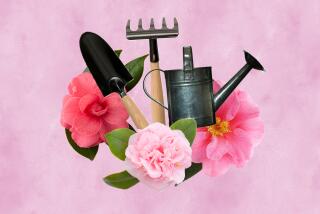The Home Gardener’s Cup of Tea
- Share via
Question: Is it true that you can make tea from camellias?
G.D., Santa Ana
Answer: Yes, tea, the world’s most consumed beverage, can be grown and harvested from the home garden. However, it is made only from leaves of Camellia sinensis.
Unlike the hundreds of varieties of camellias that produce blossoms in many striking colors, C. sinensis grows only small, white flowers. This tea bush matures in three to five years and under ideal conditions grows to 15 feet high.
Tea bushes are available by special order. Pacific Tree Farms in Chula Vista ([619] 422-2400) carries a generous supply.
C. sinensis and camellias in general have shallow, fibrous roots. They require a moist, well-drained, crumbly soil with a 6.0 pH. They usually need full shade or at least deep, filtered shade, with no exposure to cold winds.
They are evergreen and somewhat temperamental, not thriving when weather conditions vary too much. They make good container plants and should be fertilized after blooming. Generally, they are pest and disease free.
Be careful not to overfertilize, as tea plants can burn. Use a cottonseed fertilizer created for camellias and azaleas.
It is thought that use of tea began in China about 5,000 years ago, but mention in Chinese literature did not appear until AD 350. The first shipment of tea to Europe was in 1610.
There are almost 6 billion pounds of dried tea produced annually worldwide, with India, Sri Lanka and China growing the most. Great Britain imports the most at 400 million pounds per year. Americans consume about three-fourths of a pound per person annually.
There is only one tea plantation in the United States, the 30-acre Charleston Tea Plantation on Wadmalow Island near Charleston, S.C.
--Written by University of California Master Gardener Pat Whatley of Laguna Hills.
Have a problem in your yard? University of California Cooperative Extension (UCCE) Master Gardeners are here to help. These trained and certified horticultural volunteers are dedicated to extending research-based, scientifically accurate information to the public about home horticulture and pest management. They are involved with a variety of outreach programs, including the UCCE Master Garden hotline, which provides answers to specific questions. You can reach the hotline at (714) 708-1646 or send e-mail to ucmastergardeners @yahoo.com. Calls and e-mail are picked up daily and are generally returned within two to three days. Please include your name and city of residence.





